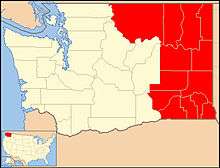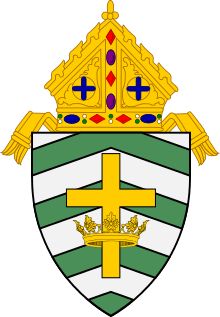Bernard Joseph Topel
Bernard Joseph Topel (March 31, 1903 – October 22, 1986) was an American prelate of the Roman Catholic Church. He served as Bishop of Spokane from 1955 to 1978.
Early life and education
Bernard Topel was born in Bozeman, Montana, the fourth son of Henry Albert and Mary Pauline (née Hagen) Topel.[1] His father was an East Prussian tailor who had come to the United States in 1878, and his mother had immigrated from Switzerland at age nine.[2][3] He attended grade school in Bozeman and, after graduating from St. Charles High School in Helena, studied at Mount St. Charles College.[3] He then studied theology at the Grand Seminary of Montreal in Quebec, Canada, before returning to the United States and entering the Catholic University of America in Washington, D.C.[1] He there earned a Master's degree in Education in 1927.[1]
Priesthood
Topel was ordained to the priesthood in Helena on June 7, 1927.[4] Furthering his studies, he then earned his Master's degree in Mathematics from Harvard University and afterwards his doctorate from the University of Notre Dame.[3] From 1934 to 1937, he served at the missions in Toston and Wolf Creek.[1] He then returned to the University of Notre Dame, where he taught mathematics for two years before returning to Montana.[1] He joined the faculty of Mount St. Charles College (later known as Carroll College), there serving as professor of mathematics and physics.[1] He also served as vocations director for the Diocese of Helena.[3]
His expertise as a mathematician was attested to by a comment by Albert Einstein, who is reported by a reliable source to have said, "only a couple of people really understood his theory of relativity and one was a young priest from Montana," referring to the future Bishop.
Episcopal ministry
On August 9, 1955, Topel was appointed Coadjutor Bishop of Spokane, Washington, and Titular Bishop of Binda by Pope Pius XII.[4] He received his episcopal consecration on the following September 21 from Bishop Joseph Michael Gilmore, with Bishops Joseph Patrick Dougherty and Joseph Clement Willging serving as co-consecrators, at the Cathedral of St. Helena.[4] Upon the death of Bishop Charles Daniel White four days later, Topel succeeded him as the third Bishop of Spokane on September 25, 1955.[4] He was installed on the following October 12 at the Cathedral of Our Lady of Lourdes.[3]
As a math professor at Carroll College for 25 years, Topel was an unlikely pick to become a bishop. He stated, "I became a bishop without ever having been a pastor or working in the chancery, the common way to become a bishop. I thought I was the least prepared man to become bishop ever. But then I decided afterward I wasn't".[2]
In 1958 he led a pilgrimage of Spokane Catholics to the shrines of Europe, including the Sanctuary of Our Lady of Lourdes in France on the 100th anniversary of the apparitions of Our Lady of Lourdes.[3] He began a mission program in Guatemala with the Maryknoll Fathers in 1960.[3] He attended all four sessions of the Second Vatican Council between 1962 and 1965. During his 22-year-long tenure, he established several parishes and schools, Mater Cleri Seminary, Bishop White Seminary on the Gonzaga University campus, Immaculate Heart Retreat House, homes for unwed mothers, and housing for the elderly.[5][2]
Austerity of life
Topel was nationally known for his austere way of life and devotion to the poor.[2] He maintained a modest residence with neither heating nor a telephone.[5] He received most of his food from his vegetable garden.[2] He donated the profits from the sale of his crosier and pectoral cross to charity, and admitted that wearing an episcopal ring made him feel "a bit out of kilter."[2] He once declared, "I have come to the realization that the most important thing I can do in the church, and that applies to Christians in general, is to live simply in order to give money to the poor."[2]
Handling of sex abuse allegations
Patrick G. O'Donnell was a priest who, by his own admission, abused at least 30 boys in the Spokane diocese.[6] Even before his ordination, concerns had been voiced about O'Donnell's sexual attraction to boys. In 1974, Walter Abel was O'Donnel's supervising priest over Patrick G. O'Donnell. Abel believed that O'Donnell was a pedophile and told the Diocesan Personnel Board it was essential that O'Donnell be moved quickly.[6] In that era, pedophilia was seen as a psychological condition amenable to treatment, somewhat similar to alcoholism, and O'Donnell was sent away for therapy.[7] Upon O'Donnel's return, Bishop Topel reassigned him to a new parish where he abused more boys.[6] Topel retired in 1978, and O'Donnell would not be exposed and suspended from the priesthood until 1986, by which time he had been assigned to several parishes and (by his own admission) abused at least 30 boys.[6][7]
Later life and death
Upon reaching the mandatory retirement age of 75, Topel retired as Bishop of Spokane on April 11, 1978.[4] He served as Apostolic Administrator of the diocese until the appointment of his successor, Lawrence Harold Welsh. He later died at St. Joseph Care Center, aged 83.[3]
References
- Curtis, Georgina Pell (1961). The American Catholic Who's Who. XIV. Grosse Pointe, Michigan: Walter Romig.
- Estes, Jane (November 13, 1978). "In Spokane: A Pauperish Yet Princely Churchman". TIME Magazine.
- "Bishop Topel dies". Spokane Chronicle. October 23, 1986.
- "Bishop Bernard Joseph Topel". Catholic-Hierarchy.org.
- "A Short History of the Diocese". Roman Catholic Diocese of Spokane. Archived from the original on May 11, 2009.
- Jonathan Martin; Ken Armstrong (October 27, 2004). "The past shadows a bishop's future". The Seattle Times. Archived from the original on April 9, 2005.
- Inlander, January 22, 2004
| Catholic Church titles | ||
|---|---|---|
| Preceded by Charles Daniel White |
Bishop of Spokane 1955—1978 |
Succeeded by Lawrence Welsh |

